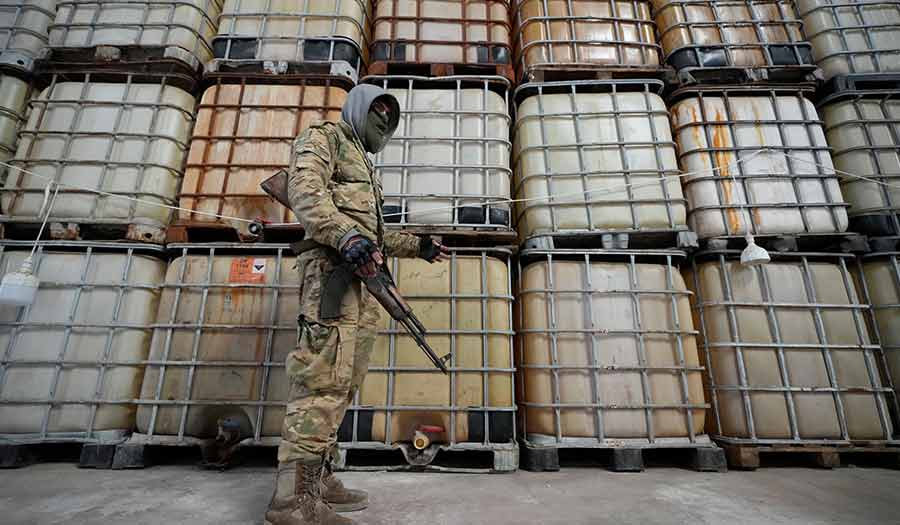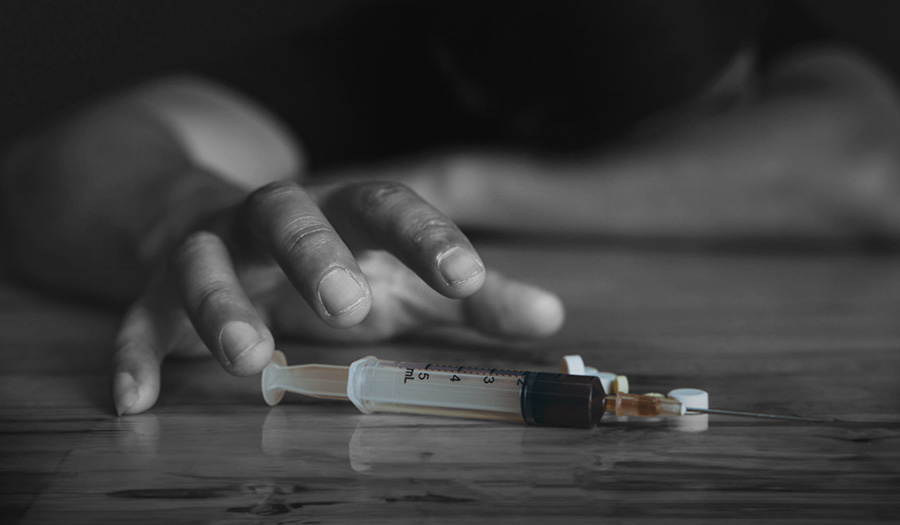 AP/Hussein Malla
AP/Hussein Malla
Article
Learn the why behind the headlines.
Subscribe to the Real Truth for FREE news and analysis.
Subscribe NowBEIRUT (AP) – Since the fall of former Syrian President Bashar Assad, industrial-scale manufacturing facilities of Captagon have been uncovered around the country, which experts say helped flourish a $10 billion annual global trade in the highly addictive drug.
Among the locations used for manufacturing the drug were the Mazzeh air base in Damascus, a car-trading company in Latakia and a former potato chip factory on the outskirts of Damascus.
The factory that once produced the crunchy snack in the suburb of Douma under the name, Captain Corn, was seized by government forces in 2018.
“Assad’s collaborators controlled this place. After the regime fell...I came here and found it on fire,” Firas al-Toot, the original owner of the factory, told The Associated Press. “They came at night and lit the drugs on fire but couldn’t burn everything.”
“From here, Captagon pills emerged to kill our people,” said Abu Zihab, an activist with Hayat Tahrir al-Sham, the main group now ruling the country, as his group gave access to journalists to the site.
Syria’s nearly 14-year-old civil war fragmented the country, crumbled the economy and created fertile ground for the production of the drug. Militias, warlords and the Assad government transformed Captagon from a small-scale operation run by small criminal groups into a billion-dollar industrial revenue stream.
The recent ousting of Mr. Assad has disrupted these networks and has given a closer look at its operations—revealing the workings of a war economy that sustained Mr. Assad’s power over Syria. Experts say the change in Syria might create an opportunity to dismantle the Captagon industry.
How Did Syria Build Its Captagon Empire?
Captagon was first developed in Germany in the 1960s as a prescription stimulant for conditions like narcolepsy. It was later outlawed due to heart issues and its addictive properties.
Its amphetamine-like effects made it popular in the Middle East among both elites and fighters, as it enhanced focus and reduced fatigue.
Mr. Assad’s government recognized an opportunity in the cheaply manufactured drug amid Syria’s economic turmoil and the heavy sanctions imposed on it.
Captagon is produced through a simple chemical process that involves mixing amphetamine derivatives with excipients to form tablets, typically in makeshift labs.
The Captagon trade began industrializing around 2018-2019 as the Assad regime—and other armed groups in Syria—invested in production facilities, warehouses and trafficking networks. This allowed Syria to emerge as the largest producer of Captagon globally, with some production also occurring in Lebanon.
Most seized consignments of Captagon originated from Syria, according to data by the New Lines Captagon Trade Project, an initiative of the New Lines Institute think tank.
Evidence of the Assad regime’s sponsorship of the Captagon industry is overwhelming, the report published in May said. The Security Office of the 4th Armored Division of the Syrian Arab Army, headed by Bashar Assad’s brother Maher oversaw operations and created a coordinated production system, the report added.
Where and How Was Captagon Smuggled?
Captagon was smuggled across the border using various methods, such as hiding it in trucks, cargo shipments and goods. Some shipments are concealed in food, electronics and construction materials to evade detection.
The primary smuggling routes were Syria’s porous borders with Lebanon, Jordan and Iraq, from which the drug is distributed throughout the region. The leading markets are wealthy Gulf countries like Saudi Arabia and the United Arab Emirates. Some were also shipped from Latakia port.
In Lebanon, the Captagon trade has flourished, particularly near the Syrian border and in the Bekaa Valley. Lebanese authorities struggled to curb the flow of Captagon from Syria, which analysts say was facilitated by the Hezbollah militant group.
Following the discovery of crates of fruit meticulously packed with bundles of the drug hidden among pomegranates and oranges, Saudi Arabia and the UAE implemented bans on Lebanese agricultural products.
Captagon has also found its way into international markets, reaching as far as Southeast Asia and parts of Europe.
How Much Revenue Did It Produce for the Assad Regime?
The annual global trade in Captagon has an estimated value of $10 billion, with the ousted Assad family’s annual profit reaching around $2.4 billion, according to Caroline Rose, director of the New York-based New Lines Institute Captagon Trade Project.
“Seeing the uncovering of so many industrial-scale facilities affiliated with the regime was shocking but not surprising. There was extensive evidence linking key regime-aligned cronies and Assad family members to the trade,” said Ms. Rose, whose organization tracks all publicly recorded Captagon seizures and lab raids. The discovery of the facilities, she said, confirmed “the concrete relationship between Captagon and the former regime.”
The exact number of factories in Syria remains unclear, but experts and HTS members estimate that there are likely hundreds spread throughout the country.
Captagon as a Narco-diplomatic Tool
While neighboring countries have long sought to curb drug trafficking, their influence over Mr. Assad was limited.
Saudi Arabia imposed strict penalties for Captagon trafficking and enhanced border security, collaborating with other Gulf states to monitor smuggling routes. However, these efforts faced challenges from the complex networks operating across Syria, Lebanon and Jordan.
Captagon provided Mr. Assad with leverage to end his political isolation. In recent years, as several Arab states reestablished ties with him, topping the trade was a key demand in talks aimed at normalizing relations. In May 2023, Syria was readmitted to the Arab League, suspended since 2011 due to Mr. Assad’s brutal crackdown on protesters.
Syria pledged to clamp down on smuggling, leading to the formation of a regional security coordination committee.
Shortly after the summit and in a possible sign of behind-the-scenes trade-offs, Jordan intensified surveillance along the Syrian border. Activists and experts attributed airstrikes on a known drug kingpin’s home and on a suspected Captagon factory near Daraa to Jordan, likely with Mr. Assad’s consent.
The Future of Captagon in Post-Assad Syria
Mr. Assad has turned Syria into “the largest Captagon factory in the world,” HTS leader Ahmad al-Sharaa stated in a victory speech at Damascus’s Umayyad Mosque on December 8. “Today, Syria is being cleansed, thanks to the grace of Almighty God.”
While Mr. Assad and his circle may have been the primary beneficiaries, there is also evidence that Syrian opposition groups were involved in drug smuggling, Rebel groups, local militias and organized crime networks manufactured and smuggled the drug to finance their operations, analysts say.
“Likely, we will see a short-term supply reduction in the trade, with a decline in the size and frequency of seizures as industrial-scale production is largely halted. However, criminal actors are innovative, likely seeking out new locations to engage in production and smuggling, particularly as demand levels remain stable,” Ms. Rose said.
They may also “seek out alternative illicit trades to engage in instead,” she said.
In addition to dismantling the Captagon trade, the country’s transitional government should “establish programs for economic development that will incentivize Syrians to participate in the country’s formal, licit economic sphere,” Ms. Rose said.
- Real Truth Magazine Articles
- AMERICAS
 Fentanyl: Can the War on Drugs Be Won?
Fentanyl: Can the War on Drugs Be Won?
More on Related Topics:
- China’s Population Falls for a Third Straight Year, Posing Challenges for its Government and Economy
- What to Know About South Korean Acting President Han’s Impeachment
- The Stunning Fall of Syria’s Government
- South Korea’s Parliament Votes to Impeach President Yoon Suk Yeol over Martial Law Order
- From Budgets to Diplomacy, South Korea Reels from Martial Law Fallout


